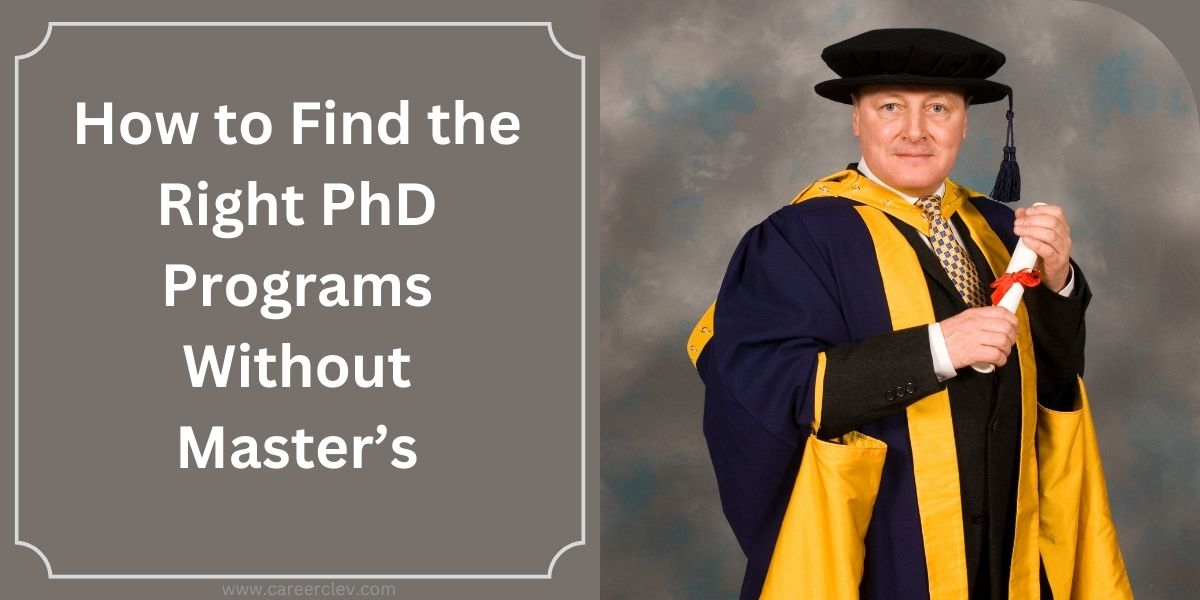Ordinarily, you will have to obtain a master’s degree first before you can pursue a PhD program. This is because a master’s degree is a prerequisite for a doctoral degree program. However, you can skip this process to get into PhD programs without a master’s. Yes, you can do that; it is very possible.
I know this may sound a little bit strange. In fact, as a result, people keep wondering if they can actually skip from a bachelor’s degree to a PhD.
Well, the answer is yes; you can actually transition to a PhD from the bachelor’s degree level, but it is not easy.
This article will explain in detail how you can get into PhD programs without a master’s and answer every question related to PhD programs without a master’s.
In addition to this, you will learn about the advantages and disadvantages of pursuing Ph.D. programs without having to acquire a master’s degree.
Is it Possible to Get a PhD Without a Master’s?
Of course, it is very possible for anyone to acquire a PhD without undergoing a master’s degree program.
The usual pathway involves students studying to acquire bachelor’s and master’s degrees before enrolling to pursue a PhD Nevertheless, they can decide to skip the graduate level in order to acquire a doctoral degree.
In some countries, like the U.K., it is very common to do this.
While some countries still require a master’s degree before applying to a PhD program, many universities around the world do not.
But before you can do this, you will have to consider a lot of factors.
See Also: Best Universities for Masters in Communication
Factors to Consider While Going from a Bachelor’s to PhD
Before choosing to switch from a bachelor’s to a PhD, there are certain factors that you must consider first. These factors include:
- Readiness
- Master’s degree programs make you stand out
- Flexibility
- A Master’s degree could promote a Ph.D. program
How do I apply for PhD programs without a master’s?
Before you apply for PhD programs without a master’s, ensure that you check if you meet the requirements of the universities to which you’re applying.
Almost every institution has different rules and regulations for making Ph.D. applications because some may require a master’s degree during the application process.
Additionally, you should make sure that you have enough evidence in your application stating why you are fit to enroll in the doctoral program by submitting visible samples of your work, which is equivalent to a master’s degree thesis.
You will also have to show that you have the motivation and willingness to contribute your quota to the institution through innovation, research, collaboration, and hard work.
Which universities offer PhD programs without Masters?
Unfortunately, there is no list of universities offering PhD programs without a master’s. This is because every university has different requirements for its doctoral degree programs.
So, make sure you check the requirements of the institution and the PhD program that you wish to apply to.
Related: What is Advanced Degree?: Q and A
If you’re able to find a university that does not require a master’s, ensure to make your application stand out because you will be up against other applicants who may hold a master’s degree.
You can also include a letter of recommendation with your application, and the letter should come from a respected university professor in the field to which you are applying.
Advantages and Disadvantages of PhD Program Without Master’s
Choosing to skip a master’s degree for a Ph.D. comes with a lot of advantages and disadvantages. You can see them below.
Advantages
Bypassing a master’s degree program for a Ph.D. helps students save money and time. Doing this will help you eliminate between one and two years of expenses during the course of the program.
Choosing to pursue Ph.D. programs without a master’s will make projects available to you. Once you find a project that you like, someone else might take it up while you are studying to acquire a master’s degree.
But by bypassing a master’s degree, you will have the opportunity to take up that research project during your doctoral program.
Disadvantages
If you don’t have a master’s degree, it could be a hindrance to you while applying for a Ph.D. program because other students who are seeking doctoral degree admission with you may have a master’s degree.
With this, they stand a better chance of securing admission than you.
The dissertation project that students undergoing a master’s degree program carry out gives them knowledge of how to handle a research project. Under the PhD program, chances are that you will choose a dissertation project for yourself.
So, if you skip the master’s degree, you will not have the opportunity to acquire the knowledge that this dissertation project offers.
Additionally, the dissertation project under the master’s degree program will enable you to work in collaboration with a project supervisor in the field. Also, see if you can do MBA after MS.
This will help you understand the relationship between a PhD student and the supervisor and decide the approach that best works for you.
With this understanding, you can now choose a supervisor who will help you find a nice PhD project. But If you bypass a master’s degree for a PhD, you will definitely miss out on this.
How to Find the Right PhD Programs Without Master’s
Finding the perfect PhD program without a master’s degree can be difficult, but it is certainly doable. Here’s a step-by-step guide to help you get through this:
1. Clarify Your Research Interests
Before you start looking for programs, establish a list of your research interests.
What field of study do you find most interesting? What specific research questions would you like to investigate? Knowing this will allow you to narrow down your choices.
2. Check Admission Requirements
Examine the requirements for admission to PhD programs at various universities.
While many programs favor applicants with a master’s degree, applicants with a solid bachelor’s degree and related research experience may be considered.
3. Identify Universities and Programs
Begin by investigating universities and programs that are relevant to your study interests. Look for universities that are well-known for their research in your field of interest.
4. Reach Out to Potential Advisors
Contact professors or researchers whose work you respect and who could be possible PhD supervisors. Inquire about PhD possibilities and express your interest in their research.
It is critical to establish a good relationship with a potential advisor.
5. Highlight Relevant Experience
Highlight any relevant research experience, articles, or projects you worked on throughout your bachelor’s degree in your application.
This can show your dedication and capacity to manage PhD-level research.
6. Prepare a Strong Statement of Purpose
Write a convincing statement of intent that explains why you want to pursue a PhD, your research interests, and why you’re a good candidate even if you don’t have a master’s degree.
Emphasize your enthusiasm, motivation, and any unique experiences or skills.
7. Prepare for Standardized Tests
GRE or other standardized test scores are required for many PhD programs. Prepare for these exams and go for high marks to boost your application.
8. Secure Strong Recommendation Letters
Request letters of recommendation from academics or professionals who can speak to your academic abilities and research potential.
9. Apply to Multiple Programs
Apply to a variety of programs, including ones that accept applicants who do not have a master’s degree. To increase your chances of acceptance, cast a wide net.
10. Consider Part-Time or Online Programs
Some universities offer part-time or online PhD programs with more flexible entry requirements. If you are unable to commit to a full-time, on-campus program, these options can be extremely beneficial.
11. Be Persistent
Be prepared for rejection, and don’t give up. It may be more difficult to gain admission to PhD programs without a master’s degree, but it is not impossible.
Continue to improve your application and apply to multiple programs until you are successful.
12. Seek Funding Opportunities
Look for scholarships, grants, and fellowships to assist with funding your PhD education. Financial assistance can make you a more appealing prospect.
13. Consider Bridge Programs
Some universities provide bridge programs to help students shift from a bachelor’s degree to a PhD.
Additional coursework and research experience are often provided in these programs to prepare you for PhD studies.
14. Network and Attend Conferences
Attend industry conferences and seminars to network with professors and researchers. Making connections can help you find opportunities and the right program.
List of PhD Programs Without Masters
While many PhD programs require applicants to have a master’s degree, other Ph.D. programs admit students with a bachelor’s degree immediately.
These PhD programs are frequently referred to as “direct entry” or “combined” programs. Consider the following options:
1. Integrated PhD Programs
Some colleges provide integrated PhD programs, which allow students to begin a PhD program immediately after finishing their bachelor’s degree.
These programs are often longer in duration than regular Ph.D. programs and may incorporate master’s-level coursework as part of the program.
2. PhD Programs with Conditional Acceptance
In some situations, universities may conditionally admit students with a bachelor’s degree.
This means that students are admitted into the Ph.D. program but may be required to complete additional coursework or achieve certain academic standards during their Ph.D. studies.
3. Research Experience
If you did a lot of research as an undergraduate, you might be able to use that experience to get into a Ph.D. program. In such circumstances, strong letters of recommendation and a well-defined research plan can be critical.
4. Professional Experience
Professional experience and accomplishments may be deemed equivalent to a master’s degree in certain professions, particularly the sciences and engineering.
Some PhD schools may admit you without a master’s degree if you have a strong track record of research or job experience in your field.
5. Alternative Routes
Alternative routes to a PhD exist in some subjects and disciplines, such as apprenticeships or industry-specific programs. These routes may not necessitate a master’s degree.
Conclusion
Remember that admittance to PhD programs can be quite competitive, but perseverance and a well-prepared application can help you overcome the challenge of not having a master’s degree.
Make your application materials stand out by emphasizing your enthusiasm, research experience, and potential for success in your chosen profession.



 Jobi.ng
Jobi.ng

